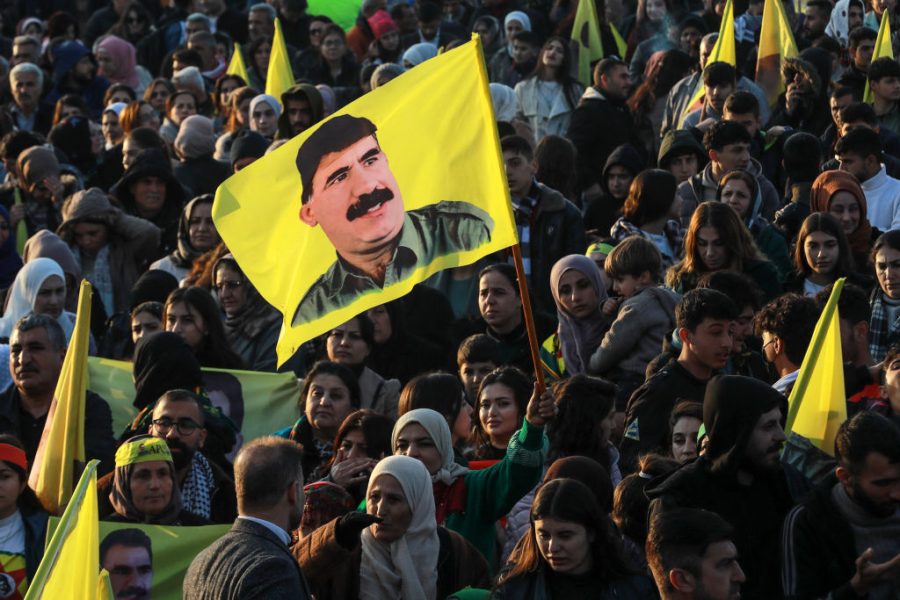On Thursday, the jailed leader of the Kurdistan Workers’ party (PKK) called on his organisation to lay down their arms and dissolve themselves. If they comply, this would put an end to a decades-long conflict with the Turkish state that has claimed the lives of over 40,000 people. The statement was delivered in a crowded press conference in Istanbul by members of the pro-Kurdish Peoples’ Equality and Democracy party (DEM).
The call appeared to be more or less unconditional. One of the speakers at the end of the conference added that ‘in practice, of course, the laying down of arms and the PKK’s self-dissolution require the recognition of democratic politics and the legal dimension.’ But it appeared more of an afterthought than a condition carved in stone.
The pressure on the opposition is not limited to the Kurdish movement
Outside, Turkish security forces were on high alert. Armed and riot police were stationed in large numbers in multiple locations in the city centre. Multiple helicopters were circling in the sky.
The Kurds, numbering around 15 million, are the second largest ethnic group in Turkey. The PKK was founded by Ocalan in the late 1970s as a reaction to the repression of Kurdish rights by the Turkish state. In the ensuing decades, they waged a bloody guerilla uprising in the mountains of the Kurdish-majority southeast and also in cities across the country. Ocalan was eventually captured and jailed on an island near Istanbul in 1999, but his organisation carried on the struggle not just in Turkey but also in Syria, Iraq, and Iran. The UK, EU, and US all recognise the PKK as a terrorist organisation.
‘Hearing it was like a cold shower,’ said a Kurdish man who is active in the movement but preferred not to be named. ‘Ocalan knows what he is doing. I don’t think the organisation [PKK] will just surrender without changes on the constitutional level. It is impossible.’ It is rare for Kurds to talk openly about the PKK in public, as the slightest expression of sympathy can result in the police kicking down the door the next morning.
The emphasis in Ocalan’s letter on this being the age of democracy and freedom of expression was rather confusing, to say the least. The DEM politician reading out the letter, Ahmet Turk, was forcibly removed from the mayorship of a large town last year after three consecutive local elections. Several of the former leaders of DEM are currently serving lengthy prison sentences. While the government holds direct negotiations with PKK leaders, journalists who dare to interview them are regularly put on trial for ‘spreading terrorist propaganda’.
The pressure on the opposition is not limited to the Kurdish movement. In recent months, President Erdogan’s government has been engaged in a crackdown on dissent with an intensity not seen in years. The leader of the anti-immigration Victory party, Umit Ozdag, is currently in prison. The mayor of Istanbul, Ekrem Imamoglu, who is President Erdogan’s biggest and most popular challenger, is facing multiple trials that could lead to several years in prison and a ban from politics.
The biggest question of all is whether the PKK leadership and its rank and file will follow the call to lay down their arms. Though Ocalan has been in solitary confinement since 1999, he still enjoys a strong personality cult in the Kurdish movement. Their political rallies are filled with his portraits and speeches full of his quotes. What few of his followers seem to be asking is how Ocalan’s mental state is after 26 years of solitary confinement on an island.
There are several other pressing questions that remain to be answered. If anything, what will the radical Kurdish movement get in return for laying down their arms? Will fighters in the mountains and activists in prison get amnesty? What will happen to the PKK-linked Syrian Democratic Forces (SDF) who control around a third of Syria, including most of its oilfields? While the US lists the PKK as a terrorist organisation, they actively support the SDF in Syria, who were their key partners in defeating the Islamic State. The coming weeks will bring some clarity on these questions.







Comments